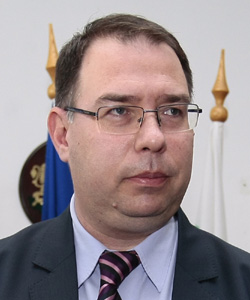On June 9, the International Archives Day was marked - a day linked to the history and memory of humankind. The message sent on this day was also to preserve this memory. On this occasion, the Chairman of the Archives State Agency, associate professor Dr. Mihail Gruev, pointed out that the strategic goal of the agency was electronic archiving.
 "The world is moving towards a complete replacement of paper documents by electronic ones. And this is a big challenge for colleagues not only in Bulgaria but also around the world. Therefore, the development of standards and rules for the entire state administration for the preservation of electronic documents is needed. Electronic documents must be first stored in institutions and then they should be given to the Archives Agency so ensuring the authenticity and security is perhaps the most important task, according to the agency's strategy for the period until 2020."
"The world is moving towards a complete replacement of paper documents by electronic ones. And this is a big challenge for colleagues not only in Bulgaria but also around the world. Therefore, the development of standards and rules for the entire state administration for the preservation of electronic documents is needed. Electronic documents must be first stored in institutions and then they should be given to the Archives Agency so ensuring the authenticity and security is perhaps the most important task, according to the agency's strategy for the period until 2020."
Associate Professor Gruev says the process is linked to the fast development of information technology, which means a lot of finances that the Archives Agency lacks.
"Anyway, this is a task of the government and the Archives Agency is the institution that is responsible for the development of standards in the short term and for collecting the first electronic documents. From our experience and thanks to our contacts with colleagues from other countries, mostly EU Member States, we know that this is a big challenge for all archive systems. Because it is not very clear whether, in 20, 30, or 50 years, these electronic documents would be readable and usable."
Upgrades are required every 5 or 10 years, while at the same time the number of electronic documents would keep growing. Everywhere in the world the full transition of the public administrations from paper to electronic documents is a big challenge. In some more developed archive systems, however, electronic archiving exists. Among the valuable new arrivals in the state archive is a collection of documents by the “Istina” Union, created in 1990 to research the crimes of the communist regime. There are lists of people who suffered repressions and documents about the early years of the totalitarian regime.
We'll add that last year the daughter of late President Zhelyu Zhelev donated the archives of her father to the agency. The daughter of Petar Mladenov, who was briefly the first President of Bulgaria after the changes 1990, also decided to provide the archives of her father to the agency. The State Archives also contain the rich archives of prominent intellectual professor Marko Semov. Professor Gazdov, former rector of the Academy of Fine Arts, has also made a donation. The donation by artist Nino Lukanov, a friend of the great Bulgarian bass Boris Christoff, is also very valuable. Lukanov is a famous artist from the theatre in Stara Zagora and a friend of Christoff. The donation includes pictures, albums, press articles and others.
English: Alexander Markov
The Days of Croatian Archaeological Heritage, which will last until 8 November, begin today at the National Archaeological Institute with Museum at the Bulgarian Academy of Sciences (NAIM-BAS) in Sofia. The event is organised by the Croatian Embassy in..
Today, 6 November, marks 104 years since the annexation of the Western Outlands in 1920. Traditionally Bulgarian territories in south-eastern Serbia and northern Macedonia were ceded to the Kingdom of Serbs, Croats and Slovenes in 1920 as a result of..
Volunteers joined the efforts to clean and restore the monastery St. Spas near Bakadzhik peak. The campaign is being organized on 2 November by Stoimen Petrov, mayor of the nearby village of Chargan, the Bulgarian news agency BTA reports. The..
The Bulgarian Land Forces are celebrating their holiday today. A statement from the Ministry of Defense's press center notes that November 19,..
The book "Ten Great Friends of Bulgaria" by journalist Milena Dimitrova will be presented this evening at 6pm at the Sts. Cyril and Methodius National..
The Getty Museum in Los Angeles, USA, is hosting a webinar today entitled Who Were the Thracians? Professor of Classical and Ancient History Matthew..

+359 2 9336 661
